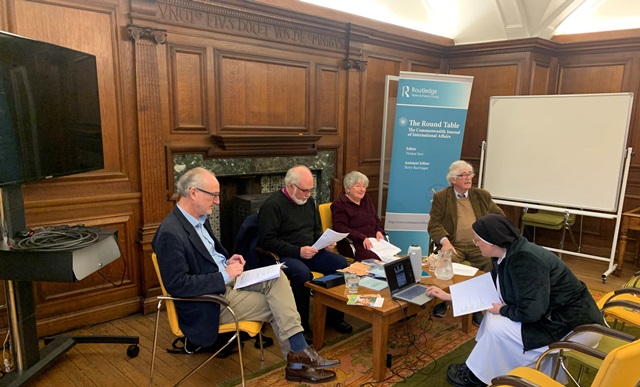 (l-r) Dr Jonathan Chaplin, Bishop Graham Kings, Terry Barringer, James Mayall and Dr Pavlina Kasparova (at the laptop). Photo by Owen Tudor.
(l-r) Dr Jonathan Chaplin, Bishop Graham Kings, Terry Barringer, James Mayall and Dr Pavlina Kasparova (at the laptop). Photo by Owen Tudor.
A panel discussion on the special issue of the Journal, on Religion and Commonwealth Values (The Round Table: Vol 112, No 5 (tandfonline.com)) was held, appropriately enough, at and jointly with the Cambridge Centre for Christianity Worldwide on Friday 12 January. Bishop Graham Kings, the founder of the Centre and now an Honorary Assistant Bishop in the Diocese of Ely, chaired the discussion and set the scene. His article on the Commonwealth and Coronation was part of the special issue.
Guest Editor Terry Barringer introduced the Commonwealth and its Charter which sums up the values of the Commonwealth. She also outlined the Commonwealth’s membership ranging from the most populous country on the planet to 33 of the world’s 42 small states. She said that the Commonwealth also contains examples of religious fundamentalism (including its impact on LGBTQI communities) and multi-faith, post-secular states. She asked whether values were the new religion of the 21st century, and whether the Commonwealth was marked more by ideas and optimism, or cynicism, scepticism and pessimism.
Dr Jonathan Chaplin, Fellow at Wesley House in Cambridge, whose research article in the special issue, Can Commonwealth values be grounded in religion? Resources from the Christian tradition, explored the post-imperial world of soft power, where religion could make a significant value-based contribution (aside from more abusive interventions). He said that religion could be enlisted behind injustice or exploited in divisive political endeavours – but it could also have a much more positive role. Jonathan suggested three positive aspects: religious recognition, pluralist inclusion and restrained polity.
Introduction to the special Round Table journal edition on Religion and Commonwealth values
Research Article: Can Commonwealth values be grounded in religion? Resources from the Christian tradition
Research Article: The role of religion in conflict and peace-making
He said that the first of these required religious literacy – a rejection of blasphemy laws, but legal restrictions on religious hatred. Pluralist inclusion would involve the acceptance of all religions, with neither discrimination nor privileging. And the final concept implied that political institutions had no monopoly on authority. Citizenship would, in this case, be only one of many elements of public life, and there would be limits to the moral reach of political institutions.
The implications of these models, Dr Chaplin said, were that the Commonwealth should facilitate religious interventions on the same basis as the G20 interfaith forum. He added that it could perhaps develop a code of practice on religion and constitutional democracy, with institutions like CMAG (the Commonwealth Ministerial Action Group) taking a more interventionist role on commitments to democracy in countries like India, Nigeria, Pakistan and Sri Lanka.
Finally, James Mayall, Professor of International Relations at Cambridge University, and past academic advisor to the Royal College of Defence Studies in London (and also a member of the Round Table editorial board), began by quoting Conor Cruise O’Brien on the United Nations, which could not do anything and never could, but was a place, a platform and a shrine. He lambasted post-Cold War triumphalist liberal internationalism, which was, ironically, not particularly popular and saw religious nationalism as cover for realpolitik. He suggested that the Commonwealth should, instead, be a platform for small states and follow the spirit of Talleyrand: “above all, not too much zeal.” Decolonisation could allow us to move beyond both exclusivism and inclusivism, recognising that all religions were divided.
Professor Mayall, too, mentioned the role of CMAG, and suggested the Commonwealth take a leaf out of the Council of Europe’s book, extending beyond nation states the possibility to refer issues to the Group.
In discussion, the role of commercialisation in shaping values was also raised, as well as the practical implications of the matters raised by the panellists, and the question of whether, in Dr Chaplin’s three models, there was any role for the Commonwealth or its constituent governments to morally improve their citizens.
Panel members and participants agreed that the issue of religion in the Commonwealth would become increasingly important and would benefit from further discussion and research.
Owen Tudor is the Deputy General Secretary of the International Trade Union Confederation and a member of the Round Table editorial board.
Related articles:
Special edition of the Round Table Journal on Religion and Commonwealth values
Blasphemy and lynching: Religious mob rule in Nigeria and Pakistan – Round Table Journal
Religion in schools is too important to marginalise – The Times



